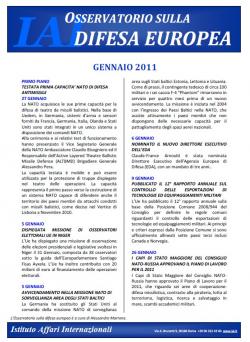Observatory on European defence, November 2006

13 November 2006
EU General Affairs and External Relations – Middle East, Balkans, Democratic Republic of Congo
Ministers examined the ESDP missions in the Middle East, Balkans and Democratic Republic of Congo.
The EU Border Assistance Mission of the Rafah Crossing Point (EU BAM Rafah) between Gaza and Egypt, operational since November 2005, was extended until 24 May 2007.
A significant reduction of the Europeans troops committed to the EU military operation Eufor-Althea, operational in Bosnia and Herzegovina since December 2004, is under consideration. The formal decision should be taken in the month of February and the reduction should be implemented from springtime 2007, depending on the security conditions on the spot; some capabilities (e.g. Battlegroups) would be maintained on the ground in the event of emergencies, until the complete disengagement foreseen for 2008. On 21 November, the UN Security Council unanimously adopted a Resolution no.1722 extending the mandate of the mission until November 2007.
Ministers intend to launch a ESDP mission in Kosovo, 1,000-1,300 men strong, aimed at restoring the rule of law in police, justice and customer sectors. The EU planning team (EUPT Kosovo), operational in Kosovo since last April for planning the mission, was extended until March 2007.
Finally ministers discussed the situation in the Democratic Republic of Congo, confirming the withdrawal by the end of the year of the approximately 1,300 men of the EU military mission Eufor Rd Congo, operational since last April to guarantee the security for the electoral process which has been positively concluded.
13 November 2006
EU Defence Ministers – Capabilites, European Defence Agency
The EU Defence Ministers , participated in the General Affairs and External Relation Council, in order to examine the six-monthly report on ESDP developments.
Regarding civil capabilities, considered increasingly important in crisis management in coordination with military ones, progress in the framework of the "Civilian Headline Goal 2008" was analysed, in particular with respect to the "Civilian Capabilites Improvement Conference" held alongside the Council, and the related ministerial statement and "Progress Report 2006".
Concerning the development of military capabilities, ministers discussed the "Force Catalogue 2006", which presents the contributions made available by member states to implement the "Headline Goal 2010". The Full Operational Capability (FOC) as of January 2007 allowing for the launch and sustainability of two simultaneous Battlegroup-size operations was confirmed; a rotation calendar for Battlegroups was ensured by member states until 2008 included.
The Council approved the report on European Defence Agency (EDA) activities for 2006 and approved an EDA budget for 2007 of about 22 million euros.
Ministers, meeting at the EDA Steering Board, launched the first Defence R&T Joint Investment Programme on Force Protection, with an initial funding of 54 million euros for the 2007-2009 period; 18 research projects were identified in the field of force protection, secured communication systems, data analysis and missions planning.
28-29 November 2006
NATO - Riga Summit
The Summit of the Heads of state and government of NATO countries was held in Riga.
One of the issues discussed was the NATO ISAF mission in Afghanistan, which recently completed the last phase of its expansion with a total of about 32,000 men. The civilian capabilities, in a place where security largely depends on police duties and training, add to the needs in terms of troops and military assets.
NATO commanders requested an increase in troops of at least 2,500 units; Poland announced a further dispatch of about 1,000 men which, until October 2007, will join the 200 Polish troops already on the spot. The issue of the national restrictions set by numerous European countries not allowing their troops to be engaged in the south against the Talibans, was partially solved by some allies who decided to renounce the restrictions and by others who said they would put them aside in case of "emergencies" to be defined by the ISAF commander.
A NATO Training Cooperation Initiative was launched for the security and defence structures and capabilities of the countries in the Middle East (especially Iraq) and the Mediterranean, including a training programme, for which a Middle East Faculty will be opened within the NATO Defence College in Rome.
Concerning the ongoing process of the transformation and adaptation of NATO, the need for a priority improvement of some capabilities was underlined for the next 10-15 years: force deployability, NATO Response Force (its full operability was declared during the Summit), strategic airlift, intelligence sharing (the NATO Intelligence Fusion Center opened last month), missile defence and network-centric operations.
November 2006
EU, US, Russia – Countering International Terrorism
During the month of November, the EU undertook several international and internal initiatives for countering terrorism.
On 6 November, the EU and the US launched a "contact group" aimed at improving cooperation in countering international terrorism and organised crime, in particular concerning personal data exchange and protection.
Also, at the EU-Russia bilateral summit held on 4 November, the willingness was expressed to pursue tighter cooperation against common threats such as international terrorism and organised crime.
-
Details
Roma, Istituto affari internazionali, 2006 -
Issue
06/11


